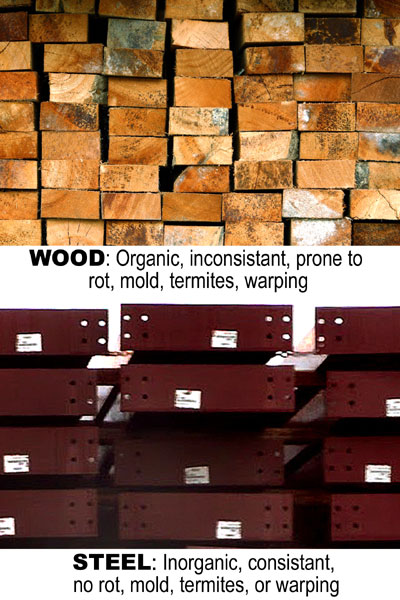Part 5: Inorganic Steel Barns vs. Organic Wood Pole Barns
When buying fresh veggies for a salad, organic produce is the smart choice. However, when choosing a building system, inorganic steel barns are the smarter choice over organic wood-framed pole barns.
Why? Pre-engineered steel barns last longer, age slower, retain their resale value longer, and need far less maintenance than ordinary pole barns. Learn more about the advantages of steel barns vs wood pole barns below.
#1: Variations
 Wood by its very nature is inconsistent.
Wood by its very nature is inconsistent.
Every species of tree varies in physical properties and strength. Location, soil composition, rainfall amounts, disease, insect infestation, and age all cause variations the physical strength of trees— even within the same species.
Differences in tree growth naturally affect the timber used for a pole barn kit.
Inconsistencies in the quality of the lumber make engineering a pole barn a “best guess” system.
There is no guesswork when using steel framing.
Steel is manufactured to strict industry standards. Every piece of a given size and gauge is uniform, with verifiable strength properties. Each component of a pre-engineered metal barn or other steel structure is consistent in both quality and performance— today and forever.
#2: Moisture Content
Another variable in the lumber used for pole barns is moisture.
As an organic material, wood experiences dramatic changes based on moisture content. It expands and contracts at different rates along the width, depth, and length as moisture content changes. The framing actually moves as humidity rises and falls. Wood framing bows, cracks, creeps, twists, and warps. Over time, nails and staples pull out, loosening the frame. Typically, a pole barn requires expensive professional straightening every few years.
Moisture changes do not affect metal barns. Bolt and screw connections stay in place. Steel framing goes up straight and stays that way for many decades of problem-free service.
#3: Mold, Rot, and Termites
The organic properties of wood make it a tempting target for mold, rot, and termites. This reduces the usefulness and value of the pole barn, while increasing maintenance costs.
Steel is impervious to mold, rot, and termites. No expensive chemical treatments or costly repairs are required for pre-engineered metal barns.
#4: Fire resistance
As an organic material, wood burns easily. Even if the fire starts elsewhere in the structure, wood framing adds fuel to a fire.
An inorganic metal barn cannot be the initial place of ignition for a structural fire— nor does steel framing add fuel to a fire.
#5: Lightning resistance
Organic wood is a poor conductor of electricity. When struck by lightning, a wood pole barn ignites easily. Since the current cannot travel easily through the wood, it may shoot out to other flammable materials, people, or animals within the structure.
Inorganic steel is a perfect conductor of electricity. When lightning strikes a well-grounded steel building, it passes harmlessly into the ground.
Call RHINO at 940.383.9566 now.
Ask for a free quote on a beautiful, durable, steel pole barn or other RHINO-tough metal building.
Related RHINO blogs:
